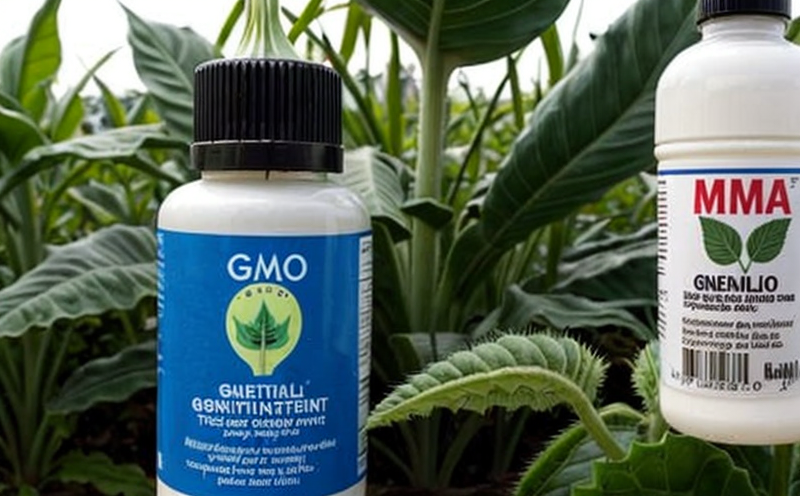ISO 32104 GMO DNA Residue Testing in Confectionery
The detection and quantification of genetically modified organisms (GMOs) is a critical component of ensuring food safety, traceability, and compliance with international standards. ISO 32104 provides a robust framework for detecting the presence of GM DNA residues in various food products, including confectionery items.
ISO 32104 focuses on the use of quantitative PCR (qPCR) methods to detect specific genetic markers associated with known GMOs. This service ensures that manufacturers can meet regulatory requirements and consumer expectations regarding the absence or presence of GMO ingredients in their products.
The process begins with careful sample collection, which is crucial for accurate results. Samples are typically collected from raw materials, intermediate products, and final confectionery products. The samples must be preserved under appropriate conditions to prevent degradation of genetic material.
Once the samples are received at the laboratory, they undergo a series of preparatory steps designed to extract DNA while minimizing contamination risks. The extraction process involves the use of specialized reagents that target plant or animal tissues commonly used in confectionery production.
The extracted DNA is then subjected to qPCR analysis using primers and probes specific to known GMO events. This step ensures high specificity, allowing for accurate identification even if multiple GM varieties are present. The efficiency of the test depends heavily on the quality of the sample preparation and the precision of the qPCR reaction.
After amplification, the fluorescence data is analyzed using software that calculates the amount of target DNA relative to a reference standard. This allows us to determine whether GMO residues are present in detectable quantities within your confectionery products.
The results from this testing process provide critical insights into the integrity of supply chains and help ensure compliance with relevant regulations such as EU Regulation 1829/2003, which mandates labeling for foods containing or derived from GMOs. By leveraging ISO 32104 compliant tests, companies can build trust among consumers who prefer non-GMO products.
Our laboratory adheres strictly to international standards ensuring accurate and reliable results every time. We employ experienced scientists trained in advanced molecular biology techniques to conduct these analyses. Their expertise guarantees that each test follows best practices outlined by ISO 32104, delivering trustworthy data for decision-making purposes.
In conclusion, implementing ISO 32104 GMO DNA residue testing is essential for maintaining quality control standards across all stages of confectionery production. It helps identify potential contamination issues early on, preventing costly recalls later down the line. Furthermore, it demonstrates a commitment to transparency and integrity which enhances brand reputation significantly.
Applied Standards
The ISO 32104 standard specifically addresses the detection of genetically modified organisms (GMOs) through DNA analysis in food products. It provides guidelines for sampling, sample preparation, and quantitative PCR (qPCR) methodologies used to quantify GM DNA residues.
This international standard is widely recognized by regulatory bodies worldwide, including the European Commission and FDA. By adhering to these standards, our laboratory ensures that all tests conducted meet industry best practices and can be relied upon for compliance purposes.
Why Choose This Test
Implementing ISO 32104 GMO DNA residue testing offers numerous benefits beyond mere regulatory compliance. Here are some key reasons why this service should be part of your quality assurance program:
- Enhanced Consumer Trust: Consumers increasingly demand transparency about the ingredients used in their food products. Demonstrating adherence to stringent international standards like ISO 32104 can significantly boost consumer confidence.
- Avoidance of Legal Penalties: Non-compliance with labeling laws regarding GMO content could result in hefty fines and damage lawsuits. Our testing ensures that you stay ahead of potential issues before they arise.
- Promotion of Brand Integrity: A reputation for maintaining high ethical standards can greatly enhance your brand image, making it more attractive to both existing customers and new ones.
- Supply Chain Security: By identifying any traces of unintended GMO contamination early in the process, you protect not only your own product but also maintain trust throughout your entire supply chain.
In addition to these benefits, our advanced testing capabilities allow us to offer accurate results quickly, enabling timely adjustments if necessary. This agility is particularly valuable during product development phases or when responding to market trends related to GMO-free labeling.
Competitive Advantage and Market Impact
Demonstrating commitment to food safety and sustainability through rigorous testing not only meets but exceeds customer expectations. For instance, many consumers now prefer products that are free from GM ingredients, driven by concerns about health impacts or environmental considerations.
By incorporating ISO 32104 GMO DNA residue tests into your quality assurance protocols, you position yourself as a leader in the food industry. This proactive approach sets your brand apart from competitors who may not prioritize similar measures:
- Innovation Leadership: Staying ahead of emerging trends and regulatory changes shows that your company is forward-thinking and innovative.
- Customer Retention: Existing clients appreciate companies that go beyond basic compliance, fostering loyalty and long-term relationships.
- New Market Expansion: Entering new markets often requires meeting stringent local standards. Demonstrating expertise in advanced testing techniques like those prescribed by ISO 32104 can open doors to previously inaccessible opportunities.
In summary, investing in comprehensive GMO DNA residue testing using the ISO 32104 methodology equips you with valuable tools necessary for navigating today’s complex regulatory landscape while simultaneously enhancing your competitive edge and market position.





